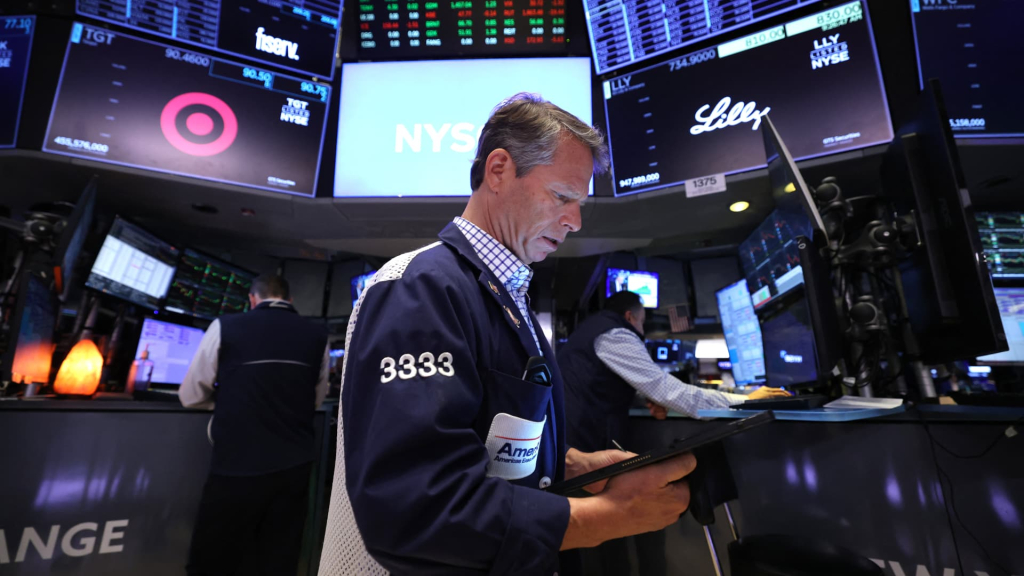Amid growing trade tensions and economic uncertainty, a notable shift is occurring among investors, many of whom are transitioning from a longstanding preference for U.S. stocks to international equities. This change comes in light of concerns that U.S. assets are becoming increasingly risky due to policies initiated by President Donald Trump.
Since the announcement of a tariff plan, the S&P 500 has seen a decline of over 6%, while both the Dow Jones Industrial Average and Nasdaq have experienced drops in excess of 7%.
Christine Benz, director of personal finance and retirement planning at Morningstar, noted that there was already a compelling case for investors to reduce their U.S. stock holdings before these recent market fluctuations. “Given recent developments, the argument for international diversification has only strengthened,” she stated.
Jacob Manoukian, head of U.S. investment strategy at J.P. Morgan Private Bank, echoed this viewpoint, suggesting that “global diversification seems like a prudent strategy,” as outlined in a recent research note.
U.S. had the world beat by ‘sizable margin’
Nevertheless, some financial experts advise caution against abandoning U.S. stocks in search of better returns overseas. Paul Christopher, head of global investment strategy at the Wells Fargo Investment Institute, characterized the U.S. market as “a quality market that looks like a bargain” despite the current volatility.
Historically, U.S. stocks have outperformed their global counterparts, with the S&P 500 posting an average annual return of 11.9% from mid-2008 through 2024, significantly surpassing developed countries’ returns.
differently, the MSCI EAFE index, which measures stock performance in developed markets outside of the U.S. and Canada, brought in average returns of just 3.6% per year during the same timeframe, according to analysts at J.P. Morgan Private Bank.
This year, however, the narrative may be shifting. Analysts have noted that the U.S. equity market has underscored the importance of diversification. Although U.S. stocks have historically outperformed on the global stage since mid-2008, a change could be on the horizon.
More from Personal Finance:
Why retirees shouldn’t fully ditch stocks
Cash may feel safe when stocks slide, but it has risks
How a trade war could impact the price of clothing
Concerns surrounding the U.S. economy’s growth have escalated due to the Trump administration’s tariff policies, which began impacting markets significantly after the White House imposed country-specific tariffs starting April 2, including a staggering 145% levy on Chinese imports.
As of Thursday morning, the S&P 500 had declined about 10% year-to-date, with the Nasdaq Composite down more than 16% in 2025. The Dow had seen losses nearing 8%, while the EAFE index was holding steady with an increase of around 7%.
Is U.S. exceptionalism dead?
The recent downturn in U.S. markets has raised questions regarding the attractiveness of U.S. assets to foreign investors and has led some analysts to wonder whether the era of ‘U.S. equity market exceptionalism’ is coming to an end. This sentiment was expressed by market analysts at Capital Economics.
In addition, increasing global trade tensions are impacting the bond market, which may jeopardize confidence among U.S. debt holders. The U.S. dollar has also faced pressure, nearing a one-year low as of Thursday morning. Analysts have remarked that it is unusual for U.S. stocks, bonds, and the dollar to decline simultaneously.
Former Treasury Secretary Janet Yellen emphasized the uncertainty created by Trump’s tariffs during a recent interview. She noted, “This is really creating an environment in which households and businesses feel paralyzed by the uncertainty about what’s going to happen,” adding that it complicates financial planning.
The U.S. fire had ‘already been burning’
Market cycles suggest that both international and U.S. stock returns fluctuate over time, typically alternating in periods of relative strength and weakness. Since 1975, U.S. stocks have historically outperformed international stocks for approximately eight-year stretches, as noted in an analysis by Hartford Funds.
Currently, the U.S. is situated 13.8 years into a cycle favoring U.S. stock performance, implying that non-U.S. equities could be due for a resurgence, according to Hartford Funds analysis.
Prior to the recent downturn, U.S. markets were already grappling with challenges as concerns over the economy’s health intensified and valuations for major technology stocks began to deflate, analysts at Capital Economics noted. “In that respect, ‘Liberation Day’ — which accentuated these moves — only added fuel to a fire that had already been burning,” they explained.
Advisors: ‘Tread carefully here’
For investors contemplating adjustments, financial experts suggest considering global stock funds, such as the Vanguard Total World Stock Index Fund ETF, which maintains a portfolio comprising approximately 63% U.S. stocks and 37% non-U.S. stocks, according to Benz of Morningstar.
As individuals near retirement, it may be wise to limit exposure to international stocks to mitigate the risks associated with currency fluctuations, she advised.
Douglas Boneparth, president of Bone Fide Wealth in New York, emphasized the significance of including international exposure as part of a core risk-adjusted portfolio for his clients.
Despite the recent underperformance of these asset classes, Boneparth noted that they have effectively helped reduce the impact of tariff volatility. However, he cautioned against making hasty decisions to increase non-U.S. equities without careful consideration.
“If you’re considering changes now, be cautious,” he warned. “Are you locking in losses from U.S. stocks to pursue international exposure? Tread carefully with such decisions.” He also encouraged investors to assess their portfolios and consider rebalancing as needed, suggesting that strategically reallocating to equities at lower values could be advantageous.
Interest in international investments has risen, as noted by CFP Barry Glassman, founder of Glassman Wealth Services. He highlighted that it is rare for clients to seek increased foreign investments, a trend that seems to be shifting now due to the outperforming nature of both foreign stocks and currencies relative to U.S. indices.
Glassman typically maintains a ratio of two-thirds U.S. stocks to one-third foreign stock funds in the portfolios he oversees and noted that no immediate changes are planned. “We’ve already made moves over time to ensure what we consider an appropriate foreign allocation,” he concluded.


























